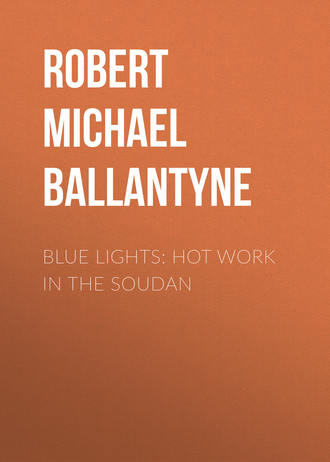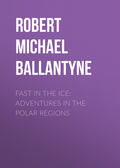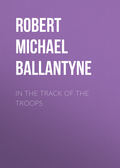
Robert Michael Ballantyne
Blue Lights: Hot Work in the Soudan
Chapter Eleven.
New and Sad mingled with Curious Experiences
At Suez Miles Milton first made acquaintance with the shady side of war.
Before the commanding officer, after parade next morning, they received marching orders, and kit-muster followed. In the afternoon the Loch-Ard steamer came in from Suakim, with sick, wounded, and invalids, and a large party was told off to assist in landing them and their baggage. Miles was one of the party. The dock where the vessel lay was three miles off, and the greater part of this distance the invalids were brought by train; but the latter part of the journey had to be done on foot by those who could walk, and on stretchers by those who could not.
Oh! it was pitiful to see those battered, sunburnt, bloodless young men, with deep lines of suffering on their faces, aged before their time, and the mere wrecks of what they once were. Men who had gone to that region strong, active, ruddy, enthusiastic, and who, after a few months, returned thus feeble and shattered—some irreparably so; others with perhaps years of joyless life before them; a few with the unmistakable stamp of death already on their brows.
There were about forty altogether. Some, as we have said, were carried from the vessel, and not one of the forlorn band could get on without the assistance of their fresh comrades from England.
One tall, deep-chested young soldier, who must have been a splendid specimen of manhood when he landed in Egypt, was supported on one side by Miles, and on the other by Stevenson.
“Halt a moment,” said the invalid, in a weak voice and with an apologetic smile. “I—I can’t get along quite as fast as I used to.”
His trembling legs and bowed back did not require the tongue or the large sunken eyes to confirm that obvious truth.
“Poor fellow!” said Miles—with difficulty, owing to the lump in his throat—“you ought to have had a stretcher. Here, sit down a bit on this stone. Have you been wounded?”
“Ay,” returned the man with a look of quiet resignation that seemed to have become habitual to him, “I have been wounded, but not by spear or bullet. It’s the climate that has done for me. I used to think that nothing under the sun could quell me, but the Lord has seen fit to bring down my pride in that matter. At the same time, it’s only fair to say that He has also raised me up, and given me greater blessings than He has taken away. They told me in Portsmouth that He would, and it has come true.”
“At the Institute?” asked Stevenson, eagerly.
“Ay—the Soldiers’ Institute,” answered the invalid.
“God bless you!” returned the marine, grasping his hand. “It was there I was brought to God myself. Cheer up, brother! You’ll soon be in hospital, where good food an’ physic an’ nursing will bring you round, may-hap, an’ make you as ship-shape as ever.”
“It may be so, if He wills it so,” returned the trooper softly; “but I have a little book called ‘Our Warfare,’ and a letter from the ‘Soldier’s Friend’ in my pocket, which has done me more good than all the hospitals and physic in Egypt can do. Come, let us go on. I’m better now.”
Rising and putting a long arm round the shoulders of each of his new friends, the trooper slowly brought up the rear of the touching procession which had already passed them on its way to Suez.
In the vessel which had brought those unfortunate men from Suakim, Miles and his comrades soon found themselves advancing down that region of sweltering heat called the Red Sea. The sight of the disabled men had naturally, at first, a depressing effect on the men; but the influence of robust health, youth, strong hope, and that light-hearted courage which makes the British soldier so formidable to his foes, soon restored to most of them their wonted free-and-easy enjoyment of the present and disregard for the future. Even the serving out of cholera-belts and pocket-filters failed to allay their exuberant spirits.
The Loch-Ard, although doubtless a good ship for carrying coals, was very ill-suited to convey troops. But in times of war, and in distant lands, soldiers lay their account with roughing it.
They soon found that a little of the physic which is supposed to be “rough on rats” would have been of advantage; for the very first night many of the men were awakened by those creatures nibbling at their toes! Everything on board was dirty: the tin pannikins were rusty, the biscuit was mouldy and full of creatures that the captain called weevils and Macleod styled wee-deevils. Some of the biscuit was so bad that it had to be thrown away, and the remainder eaten, as Moses said, with closed eyes!
“It’s an ill wind that blaws naebody guid,” said Macleod to Moses Pyne, as he came on deck to enjoy a pipe after their first dinner on board. “What d’ee think that queer cratur Flynn is doin’ doon below?”
“Nothing very useful, I daresay,” said Moses.
“Ye’re wrang for ance. He’s lyin’ in ambush there, makin’ war on the rats—ay, an’ he’s killed twa or three a’ready!”
“You don’t say so! I’ll go and see the fun.”
So saying Moses went below, but had just reached the foot of the ladder when a boot caught him violently on the shins.
“Hi! hallo! ho!” shouted Moses.
“Och! git out o’ the line o’ fire wid ye! There’s another!” growled Flynn, as he fired a second boot, which whizzed past the intruder, and a sharp squeak told that it had not been fired in vain!
Moses beat a hasty retreat, and the Irishman continued the fight with that indomitable perseverance for which his countrymen are famous. There is no saying how long the action would have lasted, but in his energy he knocked away the support of a shelf behind him and a small cask of large nails, taking him in rear, sent him sprawling on the deck and routed him.
This misadventure did not, however, terminate the war. On the contrary, rat-hunting became a favourite pastime during the voyage down the Red Sea. Our hero, of course, took his turn at the fighting, but we believe that he never received a medal for his share in that war.
They spent one Sunday on the deep, but the only record made of it in the journal of the soldier from which most of our facts are gathered is that they “had prayers in racing style—against time!”
As if to cleanse themselves from the impropriety of this act the soldiers had a grand washing of clothes on the following day, and the day after that they arrived at Suakim.
“It is what I call a dreary, dismal-looking town,” said Miles to Armstrong, as they approached.
“Might be worse,” replied his friend.
“Ye aye tak a cheery view o’ things, Airmstrong.”
“An’ what for no?” asked Sutherland.
“You may well ask why not,” said Sergeant Hardy. “I think it wisest to look always on the bright side of things.”
“Whether it’s dreary or pleasant we’ll have to make the best we can of it, boys,” said Stevenson; “for this is to be our home for some time to come.”
“Horrible!” growled Simkin, whose spirit was essentially rebellious.
“Ochone!” sighed Flynn, who, we need scarcely say, was essentially jolly.
Further remark was cut short by the voice of Captain Lacey ordering the men to fall in, as the colonel in command was coming on board to inspect them.
The night of the arrival of the 310th was dreadfully hot, insomuch that many of the men found it impossible to sleep. But in the silence of that night food for reflection was supplied to the wakeful, in the form of sounds that were new to many, but soon became familiar to all—namely, the boom of big guns and the rattle of musketry. Osman Digna was making one of his customary attacks on the town, and the defenders were repelling him. Of course the sanguine among the new arrivals were much excited, and eager to join in the fray; but their services were not required that night. Osman and his dusky hordes were being repulsed as usual, and the reinforcements were obliged to content themselves with merely listening to the sounds of war.
Chapter Twelve.
In Action at last
No time was lost in sending the newly-arrived troops to their sphere of duty.
There was something appropriate in their landing on that day of gunpowdery memories, the 5th of November. It was four o’clock when they disembarked. By four-thirty they were drawn up and inspected by the General, and immediately thereafter marched off in detachments to their respective stations—to Sphinx Redoubt, Fort Commodore, Bulimba, and other points of defence.
The detachment in which Miles Milton found himself was led by Captain Lacey to Sphinx Redoubt, where he was greatly pleased to find that his new friend, private Stevenson of the marines, was also stationed with some of his comrades.
There are probably times in the experiences of most of us when we seem to awake out of a long dream and begin to appreciate fully that the circumstances in which we are placed are stern realities after all. Such a time of awakening came to our hero when he and his comrades each received fifty rounds of ball-cartridge, and stood ready to repel assault on the defences of Suakim.
Hitherto drill and reviews had seemed to him a good deal like playing at soldiers. Even when the distant sound of the big guns and the rattle of small arms touched his ear, the slumber of unbelief was only broken—not quite dispelled. But now, weighted with the deadly missiles, with rifle in hand, with ears alert to every sound, and eyes open to every object that might present itself on the sandy waste beyond the redoubt, and a general feeling of expectancy pervading his thoughts and feelings, he became clearly convinced that the recent past was no flight of the imagination—that he was in very truth a soldier, and that his fighting career had in reality begun!
Now, it may not be out of place here to state that our hero was not by nature a combative man. We think it necessary to point this out, because the somewhat pugnacious introduction of Miles into our story may have misled the reader on this point. His desire for a soldier’s life was founded on a notion that it would prove to be a roving, jovial, hilarious sort of life, with plenty of sport and adventure in foreign lands. Of course he knew that it implied fighting also, and he was quite ready for that when it should be required of him; but it did not occur to him to reflect very profoundly that soldiering also meant, in some instances, exposure to withering heat during the day and stifling heat during the night; to thirst that seems unquenchable, and fatigue from prolonged duty that seems irreparable; to fits of sickness that appear to eliminate from stalwart frames all the strength they had ever possessed; and fits of the “blues” that render the termination of life a subject of rather pleasant contemplation than otherwise. But all these things he found out at Suakim!
Moreover, it had not occurred to him to think deeply on the fact that fighting meant rushing at a fellow-man whose acquaintance he had not made before; against whom he had not the slightest feeling of ill-will, and skewering him with a bayonet, or sending a bullet into him which would terminate his career in mid-life, and leave a wife and children—perhaps a mother also—disconsolate. But he also found that out at Suakim!
We repeat that Miles had no desire to fight, though, of course, he had no objection. When the officer in command sent him and his comrades to their station—after the ball-cartridge supply just referred to—and told them to keep a sharp look-out, for Osman Digna was giving them a great deal of trouble at the time, and pointed out where they were to go if attacked, and warned them to be ready to turn out on the instant that the bugle should sound the alarm, Miles was as full of energy and determination to fight and die for his country as the best of his comrades, though he did not express so strong a wish for a “brush with the enemy,” as some of them did, or sympathise much with Corporal Flynn when he said—
“It’s wishin’ I am that Osman an’ his dirty naygurs would come down on us this night, for we’re fresh an’ hearty, just off the say, burnin’ for fame an’ glory, ivery mother’s son of us, an’ fit to cut the black bastes up into mince-meat. Och! but it’s thirsty I am!”
“If ye spoke less an’ thocht mair ye wadna be sae dry, maybe,” remarked Saunders, in a cynical tone.
“Hoots, man, let the cratur alane,” said Macleod, as he busied himself polishing up some dim parts of his rifle. “It’s no muckle pleesure we’re like to hae in this het place. Let the puir thing enjoy his boastin’ while he may.”
“Sure an’ we’re not widout consolation anyhow,” retorted the corporal; “for as long as we’ve got you, Mac, and your countryman, to cheer us wid your wise an’ lively talk we’ll niver die o’ the blues.”
As he spoke a tremendous explosion not far off caused the redoubt to tremble to its foundations. At the same moment the alarm sounded, the men sprang up, seized their arms, and stood ready for an attack; but to their surprise no attack was made.
“Surely it must have been one of the mines you were telling me about,” said Miles, in a low voice to Sergeant Gilroy, who stood near to him.
“It was one of them unquestionably, for a corporal of the Berkshire regiment told me Lieutenant Young placed the mine there yesterday.”
While Gilroy was speaking, Lieutenant Young himself came along, engaged in earnest conversation with Captain Lacey, and stood still close beside Miles.
“What puzzles me, is that they have not followed it up with a few volleys, according to their usual custom,” said the former, in a low voice. “Luckily they seldom do any harm, for they are uncommonly bad shots, but they generally try their best to do us mischief, and always make a good deal of noise about it.”
“Perhaps,” suggested Captain Lacey, “your mine has done so much execution this time, and killed so many men, that they’ve got a fright and run away.”
“It may be so, but I think not. The Soudanese are not easily frightened, as we have some cause to know.”
“Have you many mines about?” asked the captain.
“Yes, we have a good many. And they form a most important part of our defence, for we are not very well supplied with men, and the Egyptian troops are not to be depended on unless backed up by ours. These mines require to be carefully handled, however, for our shepherds take the cattle out to graze every day, so that if I were to fail to disconnect any of them in the mornings, we should have some of our cattle blown up; and if I failed to connect them again at night, the enemy would attack us more vigorously. As it is, they are very nervous about the mines. They have pluck to face any foe that they can see, but the idea of an unseen foe, who lurks underground anywhere, and may suddenly send them into the sky like rockets, daunts them a bit.”
“And little wonder!” returned the captain. “From what you say I judge that you have the management of most of the mines.”
“Of all of them,” answered the lieutenant, with a modest look.
There was more than modesty in this young officer of Engineers; there was heroism also. He might have added, (though he did not), that this duty of connecting and disconnecting the mines each night and morning was such a dangerous service that he declined to take men out with him, and invariably did the work personally and alone.
The mystery of the explosion on the night we write of was explained next morning when a party sallied forth to see what damage had been done. They found, instead of dismembered men, the remnants of a poor little hare which had strayed across the fatal line of danger and been blown to atoms. Thus do the lives of the innocent too often fall a sacrifice to the misdeeds of the guilty!
Next night, however, the defenders were roused by a real attack.
The day had been one of the most trying that the new arrivals had yet experienced. The seasoned men, who had been formed by Nature, apparently, of indestructible material, said it was awful. The thermometer stood at above 110 degrees in the shade; there was not a breath of air moving; the men were panting, almost choking. Even the negroes groaned, and, drawing brackish water from a well in the fort, poured it over their heads and bodies—but with little benefit, for the water itself was between 95 and 100 degrees!
“It’ll try some o’ the new-comers to-night, if I’m not mistaken,” remarked one of the indestructible men above referred to, as he rose from dinner and proceeded to fill his pipe.
“Why d’you think so?” asked Sergeant Hardy, whose name was appropriate, for he continued for a long time to be one of the indestructibles.
“’Cause it’s always like this when we’re goin’ to have a horrible night.”
“Do the nights vary much?” asked Armstrong, who was still busy with his knife and fork.
“Of course they do,” returned the man. “Sometimes you have it quite chilly after a hot day. Other times you have it suffocatin’—like the Black Hole of Calcutta—as it’ll be to-night.”
“What sort o’ hole was that?” asked Simkin, whose knowledge of history was not extensive.
“It was a small room or prison into which they stuffed a lot of our men once, in India, in awful hot weather, an’ kep’ them there waitin’ till the Great Mogul, or some chap o’ that sort, should say what was to be done wi’ them. But his Majesty was asleep at the time, an’ it was as much as their lives was worth to waken him. So they had to wait, an’ afore he awakened out o’ that sleep most o’ the men was dead—suffocated for want o’ fresh air.”
“I say, Mac, pass the water,” said Moses Pyne. “It makes a feller feel quite gaspy to think of.”
The weather-prophet proved to be right. That night no one could sleep a wink, except the big Scotsman Macleod. To make matters worse, the insects of the place were unusually active. One of them especially, not much bigger than a pin-point, was irritating out of all proportion to its size, and it kept up, during the night, the warfare which the innumerable flies had waged during the day.
“It’s no use trying to sleep, Willie,” said Miles to Armstrong, who was next to him, as they lay on the flat roof of the redoubt, with their rifles resting on the sandbags which formed a slight protection from the enemy’s fire when one of the frequent attacks was made on the town.
“So I find,” returned his friend. “I have tried everything. Counting up to hundreds of thousands has made me rather more wakeful. I find that thinking of Emmy does me most good, but even that won’t produce sleep.”
“Strange!” remarked Miles. “I have been trying the same sort of thing—without success. And I’ve had an unusually hard day of it, so that I ought to be ready for sleep. You were in luck, being on police-duty.”
“H’m! I don’t think much of my luck. But let’s hear what you have been up to all day.”
“Well, first, I began by turning out at 5:30 a.m.,” said Miles, rolling with a sigh on his other side, for a uniform, cross-belts, boots, ammunition, etcetera, don’t, after all, form an easy night-dress. “After a cup of coffee I fell in with a lot of our fellows, and was told off for fatigue-duty. Worked away till 7:30. Then breakfast. After that I had to clear up the mess; then got ready for inspection parade at 9:30, after which I had to scrub belts, and clean up generally. Dinner over, I was warned to go on night-guard; but, for some reason which was not stated to me, that was changed, and I’m not sorry for it, because the heat has taken a good deal out of me, and I prefer lying here beside you, Willie, to standing sentry, blinking at the desert, and fancying every bush and stone to be a dusky skirmisher of Osman Digna. By the way, if that mountain range where the enemy lies is twelve or fourteen miles distant from the town, they have a long way to come when they take a fancy to attack us—which is pretty often too. They say he has got two hundred thousand men with him. D’you think that can be true?”
A gentle trumpet-note from his friend’s nose told Miles that he had brought about what thoughts of Emmy had failed to accomplish!
Thoughts of Marion had very nearly brought himself to a similar condition, when a trumpet-blast, the reverse of gentle, roused the whole line of defence, and, immediately after, sharp firing was heard in the direction of the right Water fort, which was manned by marines with two Krupp guns and a Gardner. A few rounds from the big guns drove the enemy back in that direction.
Miles and those around him, however, had not to turn out. Owing to their position on the roof of the Sphinx Redoubt, they had only to roll on their fronts, rest their rifles on the sandbags, and they were at once ready for action.
Round the various forts and redoubts deep and broad trenches had been dug, and they were rendered otherwise as strong as possible. The right and left Water forts formed the first line of defence. The latter fort, being manned by Egyptian troops, was more frequently favoured with the attentions of Osman than the others, for the marines were splendid men, and the native chief was well aware of that. All the places around, which offered the slightest shelter to the enemy, had been carefully measured as to distance, so that the exact range could be fixed at a moment’s notice. Then the war-vessels and one of the forts were furnished with electric lights, so that by bringing these to bear on the foe, as well as the big and little guns—not to mention mines and rifles—the attacking host had always a warm reception when they paid a visit to the town, and never stayed long!
The defenders required all these aids, however; for, besides a regiment of Egyptian infantry, a company of Royal Engineers, and about 500 marines, there was only one small battalion of British troops and a regiment of Egyptian cavalry. These last were extremely useful. Every day they went out scouting and clearing around Suakim, and had frequent skirmishes with the enemy, in all of which they were said to have behaved very well indeed.
Our party on the redoubt had not lain there long when a sheet of flame seemed to flash out of the darkness in front of them. It was followed by the rattle of small arms. Instantly the redoubt replied; bullets whizzed overhead, and our hero received what has of late been called a “baptism of fire.”
But he was so busy plying his own weapon that he scarcely realised the fact that death was ever and anon within a few inches of him, until a bullet ripped the sandbag on which his rifle rested and drove the sand into his face. He became a wiser man from that hour, and soon acquired the art of performing his duty with the least possible exposure of his person, and that for the briefest possible space of time!
Like a first-rate detective, the electric light sought out and exposed their foes; then withering volleys sent them scurrying across the country back to their native hills.
“Sure it’s wid wan eye open we’ve got to slape whin the murtherin’ rascals come down on us like that,” observed Corporal Flynn, when the firing had slackened to a few dropping shots on both sides.
“Av they’d only stand fornint us in the open, it’s short work we’d make o’ them. There’s no more pluck in them than in my smallest finger.”
It seemed as if righteous retribution were being meted out that night, for a spent ball entered the fort at that moment and, strange to say, hit the extreme tip of the corporal’s little finger!
A howl, as much of surprise as pain, apprised his comrades of the fact, and a hearty laugh followed when the trifling extent of the injury was ascertained.
“Serves you right, Flynn, for boasting,” said Armstrong, with a grim smile, as he stretched himself out and rested his head on a sandbag. “Moreover, you are unjust, for these black fellows are as brave a lot o’ men as British troops have ever had to face. Good-night, boys, I’m off to the land of Nod!”







